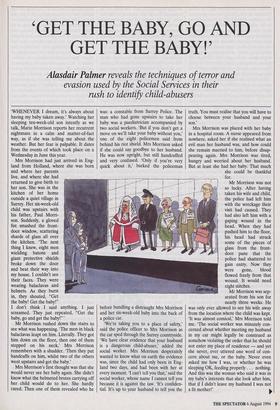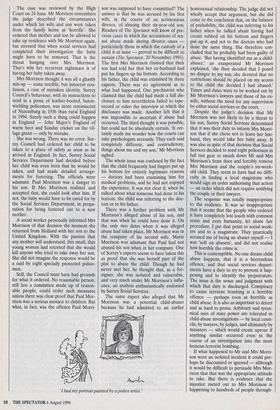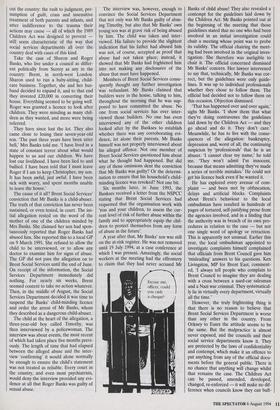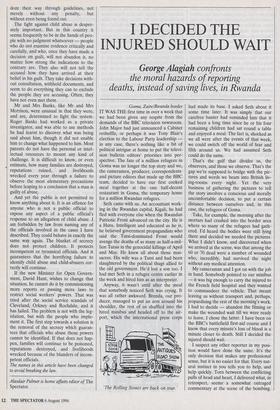`GET THE BABY, GO AND GET THE BABY!'
Alasdair Palmer reveals the techniques of terror and
evasion used by the Social Services in their rush to identify child-abusers
`WHENEVER I dream, it's always about having my baby taken away.' Watching her sleeping ten-week-old son intently as we talk, Marie Morrison reports her recurrent nightmare in a calm and matter-of-fact way, as if she was telling me about the weather. But her fear is palpable. It dates from the events of which took place on a Wednesday in June this year.
Mrs Morrison had just arrived in Eng- land from Holland, where she was born and where her parents live, and where she had returned to give birth to her son. She was in the kitchen of her home outside a quiet village in Surrey. Her six-week-old child was upstairs with his father, Paul Morri- son. Suddenly, a gloved fist smashed the front- door window, scattering shards of glass all over the kitchen. 'The next thing I knew, eight men wielding batons and giant protective shields broke down the door and beat their way into my house. I couldn't see their faces. They were wearing balaclavas and helmets. As they burst in, they shouted, "Get the baby! Get the baby!" I don't think I said anything. I just screamed. They just repeated, "Get the baby, go and get the baby!"' Mr Morrison rushed down the stairs to see what was happening. 'The men in black balaclavas leapt on him. Literally. They got him down on the floor, then one of them stepped on his neck,' Mrs Morrison remembers with a shudder. 'Then they put handcuffs on him, whilst two of the others went upstairs and got the baby.'
Mrs Morrison's first thought was that she would never see her baby again. She didn't know what the helmeted brutes carrying off her child would do to her. She hardly cared. Then one of them revealed who he was: a constable from Surrey Police. The man who had gone upstairs to take her baby was a paediatrician accompanied by two social workers. 'But if you don't get a move on we'll take your baby without you,' one of the eight policemen said from behind his riot shield. Mrs Morrison asked if she could say goodbye to her husband. He was now upright, but still handcuffed and very confused. 'Only if you're very quick about it,' barked the policeman before bundling a distraught Mrs Morrison and her six-week-old baby into the back of a police car.
`We're taking you to a place of safety,' said the police officer to Mrs Morrison as the car sped through the Surrey countryside. `We have clear evidence that your husband is a dangerous child-abuser,' added the social worker. Mrs Morrison desperately wanted to know what on earth the evidence was, since the child had only been in Eng- land two days, and had been with her at every moment. 'I can't tell you that,' said the social worker, whose name I cannot tell you because it is against the law. 'It's confiden- tial. It's up to your husband to tell you the truth. You must realise that you will have to choose between your husband and your son.'
Mrs Morrison was placed with her baby in a hospital room. A nurse appeared from nowhere, asked her if she realised what an evil man her husband was, and how could she remain married to him, before disap- pearing again. Mrs Morrison was tired, hungry and worried about her husband. But at least she had her baby. That much she could be thankful for.
Mr Morrison was not so lucky. After having taken his wife and child, the police had left him with the wreckage their visit had caused. They had also left him with a gaping wound in the head. When they had pushed him to the floor, his head had struck some of the pieces of glass from the front- door pane that the police had shattered to gain entry. Now they were gone, blood flowed freely from that wound. It would need eight stitches.
Mr Morrison was sep- arated from his son for nearly three weeks. He was only ever allowed to see his wife away from the location where the child was kept. `It was almost comical,' Mrs Morrison told me. 'The social worker was minutely con- cerned about whether meeting my husband in my car might legally be construed as somehow violating the order that he should not enter my place of residence — and yet she never, ever uttered one word of con- cern about me, or the baby. Never even asked me how I was, or whether he was sleeping OK, feeding properly . . nothing. And this was the woman who said it was in my baby's interests that she look after him, that if I didn't leave my husband I was not a fit mother!' The case was reviewed by the High Court on 24 June. Mr Morrison remembers the judge described the circumstances under which his wife and son were taken from the family home as 'horrific'. She ordered that mother and son be allowed to take up residence with Mr Morrison again, but stressed that when social services had completed their investigation the baby might have to be removed. That is the threat hanging over Mrs Morrison. That's why her recurrent nightmare is of having her baby taken away.
Mrs Morrison thought it was all a ghastly mix-up — some terrible, but innocent con- fusion, a case of mistaken identity. Surrey Council's behaviour, with its instructions to send in a posse of leather-booted, baton- wielding policemen, was more reminiscent of Nuremburg in 1936 than rural England in 1994. Surely such a thing could happen in England — John Major's England of warm beer and Sunday cricket on the vil- lage green — only by mistake.
She was wrong. There was no error. Sur- rey Council had ordered her child to be taken to a place of safety as soon as he arrived in England. In fact, Surrey Social Services Department had decided before her child was even born that he would be taken, and had made detailed arrange- ments for fostering. The officials were adamant. Paul Morrison was a danger to his son. If Mrs Morrison realised and accepted that, she could look after him. If not, the baby would have to be cared for by the Social Services Department, in prepa- ration for being fostered out to a new mother.
A social worker personally informed Mrs Morrison of that decision the moment she returned from Holland with her son to the United Kingdom. With the passion that any mother will understand, this small, thin young woman had retorted that she would kill anyone who tried to take away her son. She did not imagine the response would be a raid by eight specially protected police- men.
Still, the Council must have had grounds for what it ordered. No reasonable person, still less a committee made up of reason- able people, could order such measures unless there was clear proof that Paul Mor- rison was a serious menace to children. But what, in fact, was the offence Paul Morri- son was supposed to have committed? The answer is that he was accused by his first wife, in the course of an acrimonious divorce, of abusing their six-year-old son. Readers of The Spectator will know of pre- vious cases in which the accusations of sex- ual abuse made during divorce cases particularly those in which the custody of a child is at issue — proved to be difficult to sustain (The Spectator, 20 November 1993). The first Mrs Morrison claimed that their son had told her that her ex-husband had put his fingers up his bottom. According to his father, the child was examined by three experts. There was no agreement as to what had happened. One psychiatrist who claimed that the child had made a full dis- closure to him nevertheless failed to tape- record or video the interview at which the disclosure was made. Another felt that it was impossible to ascertain if abuse had occurred. The third thought it was possible, but could not be absolutely certain. 'It cer- tainly made me wonder how the courts can take psychologists seriously. They each said completely different, and contradictory, things about me and my son,' Mr Morrison sighed.
The whole issue was confused by the fact that the child frequently had fingers put up his bottom for entirely legitimate reasons — doctors had been examining him for medical problems, and he had not enjoyed the experience. It was not clear if, when he talked about what someone had done to his bottom, the child was referring to the doc- tors or to his father.
There was a further problem with Mr Morrison's alleged abuse of his son, and that was when he could have done it. On the only two dates when it was alleged abuse had taken place, Mr Morrison was in the company of his second wife. Marie Morrison was adamant that Paul had not abused his son when in her company. One of Surrey's experts seems to have taken this as proof that she was herself part of the plot to abuse the child. Though he had never met her, he thought that, as a for- eigner, she was isolated and vulnerable, and very much under Mr Morrison's influ- ence, an analysis enthusiastically endorsed by Surrey Social Services.
The same expert also alleged that Mr Morrison was a potential child-abuser because he had admitted to an earlier '1 had my portrait painted by a police artist.' homosexual relationship. The judge did not wholly accept that argument, but she did come to the conclusion that, on the balance of probability, the child was referring to his father when he talked about having had cream rubbed on his bottom and fingers put up it, and not to the doctors who had done the same thing. She therefore con- cluded that he probably had been guilty of abuse. 'But having identified me as a child- abuser,' an exasperated Mr Morrison explained, 'she then decided that I posed no danger to my son; she decreed that no restrictions should be placed on my access to the child she decided I had abused.' Times and dates were to be worked out by Mr Morrison's lawyers and those of his ex- wife, without the need for any supervision by either social services or the court.
Despite the judge's decision that Mr Morrison was not likely to be a threat to his son, Surrey Social Services determined that it was their duty to inform Mrs Morri- son that if she chose not to leave her hus- band, they would take her baby away. It was also in spite of that decision that Social Services decided to send eight policemen in full riot gear to smash down Mr and Mrs Morrison's front door and forcibly remove Mrs Morrison and the couple's six-week- old child. They seem to have had no diffi- culty in finding a local magistrate who would sign an order authorising that action — an order which did not require notifying the couple or their lawyers.
The response was totally inappropriate to the evidence. It was so inappropriate that it seems that the people who ordered it have completely lost touch with common sense and even humanity, let alone fair procedure. I put that point to social work- ers and to a magistrate. They practically accused me of being an abuser myself — I was 'soft on abusers', and did not realise how horrible the crime is.
This is contemptible. No one denies child abuse happens, that it is a horrendous offence, and that social services depart- ments have a duty to try to prevent it hap- pening and to identify the perpetrators. The issue is the sense and judgment with which that duty is discharged. Conspiracy to cause terrorist bombing is a horrible offence — perhaps even as horrible as child abuse. It is also as important to detect and as hard to prove. Arbitrary and tyran- nical uses of state power are tolerated in child-abuse investigations — by local coun- cils, by lawyers, by judges, and ultimately by ministers — which would create uproar if anything similar occurred even in the course of an investigation into the most heinous terrorist bombing.
If what happened to Mr and Mrs Morri- son were an isolated incident it could per- haps be discounted or ignored — although it would be difficult to persuade Mrs Mor- rison that that was the appropriate attitude to take. But there is evidence that the injustice meted out to Mrs Morrison is happening to hundreds of people through- out the country: the rush to judgment, pre- sumption of guilt, crass and insensitive treatment of both parents and infants, and utter indifference to the trauma their actions may cause — all of which the 1989 Children Act was designed to prevent still seem characteristic of the way that social services departments all over the country deal with cases of this kind.
Take the case of Sharon and Roger Banks, who live under a council as differ- ent politically from Surrey as any in the country: Brent, in north-west London. Sharon used to run a baby-sitting, child- care business. Together, she and her hus- band decided to expand it, and to that end they invested £20,000 in converting their house. Everything seemed to be going well. Roger was granted a licence to look after children. They were minding as many chil- dren as they wanted, and more were being referred.
They have since lost the lot. They also came close to losing their seven-year-old son. 'The past three years have been utter hell,' Mrs Banks told me. 'I have lived in a state of constant terror about what would happen to us and our children. We have lost our livelihood. I have been lied to and bullied. I have been told that I must leave Roger if I am to keep Christopher, my son. It has been awful, just awful. I have been sick with worry, and spent months unable to leave the house.'
The cause of it all? Brent Social Services' conviction that Mr Banks is a child-abuser. The truth of that conviction has never been sustained, or even tested, in court. The ini- tial allegation rested on the word of the mother of one of the children minded by Mrs Banks. She claimed her son had spon- taneously reported that Roger Banks had abused him. She reported this to a local GP on 9 March 1991. She refused to allow the child to be interviewed, or to allow any doctor to examine him for signs of abuse. The GP did not pass the allegation on to Brent Social Services until the end of June, On receipt of the information, the Social Services Department immediately did nothing. For nearly six weeks, Brent seemed content to take no action whatever. Then, in the middle of August, the Social Services Department decided it was time to suspend the Banks' child-minding licence and order the arrest of Mr Banks, whom they described as a dangerous child-abuser.
The child at the heart of the allegation, a three-year-old boy called Timothy, was then interviewed by a policewoman. The interview was about events, the most recent of which had taken place five months previ- ously. The length of time that had elapsed between the alleged abuse and the inter- view 'confirming' it would alone normally be enough to ensure the child's statement was not treated as reliable. Every court in the country, and even most psychiatrists, would deny the interview provided any evi- dence at all that Roger Banks was guilty of sexual abuse. The interview was, however, enough to convince the Social Services Department that not only was Mr Banks guilty of abus- ing Timothy, but also that Mr Banks' own young son was at grave risk of being abused by him. The child was taken and inter- viewed. His failure to provide the slightest indication that his father had abused him was not, of course, accepted as proof that abuse had not taken place; instead, it showed that Mr Banks had frightened him into not making any disclosures of the abuse that must have happened.
Members of Brent Social Services conse- quently thought any further investigation was redundant. Mr Banks claimed that builders were in the house, talking to him, throughout the morning that he was sup- posed to have committed the abuse. No one from social services has ever inter- viewed those builders. No one has even interviewed any of the other children looked after by the Bankses to establish whether there was any corroborating evi- dence, let alone their parents. Mr Banks himself was not properly interviewed about his alleged offence. Not one member of Brent Social Services questioned him about what he thought had happened. But did any of those omissions dent the conviction that Mr Banks was guilty? Or the determi- nation to ensure that his household's child- minding licence was revoked? Not one bit.
Six months later, in June 1993, the Bankses received a letter from the NSPCC stating that Brent Social Services had requested that the organisation work with `you and your children, to assess the cur- rent level of risk of further abuse within the family and to appropriately equip the chil- dren to protect themselves from any form of abuse in the future'.
A year after that, Mr Banks' son was still on the at-risk register. He was not removed until 19 July 1994, at a case conference at which I was present. Amazingly, the social workers at the meeting had the effrontery to claim that they had never accused Mr Banks of child abuse! They also revealed a contempt for the guidelines laid down by the Children Act. Mr Banks pointed out at the beginning of the meeting that those guidelines stated that no one who had been involved in an initial investigation could chair a meeting whose point was to probe its validity. The official chairing the meet- ing had been involved in the original inves- tigation. She therefore was ineligible to chair it. The official concerned dismissed Mr Banks' concern. Her lawyer intervened to say that, technically, Mr Banks was cor- rect, but the guidelines were only guide- lines. It was up to individual professionals whether they chose to follow them. The official had decided not to follow them on this occasion. Objection dismissed.
`That has happened over and over again,' sighs Mr Banks. 'I show them that what they're doing contravenes the guidelines laid down by the Children Act — and they go ahead and do it. They don't care.' Meanwhile, he has to five with the conse- quences of the allegation: bankruptcy, depression and, worst of all, the continuing suspicion by 'professionals' that he is an abuser. 'I cannot clear my name,' he told me. 'They won't admit I'm innocent, because that means admitting they've made a series of terrible mistakes.' He could not get his licence back even if he wanted it.
He has explored every avenue of com- plaint — and been met by obfuscation, delays and artificial blocks. Complaints about Brent's behaviour to the local ombudsman have resulted in hundreds of pages of tortured, self-justifying prose from the agencies involved, and in a finding that the authority was in breach of its own pro- cedures in relation to the case — but not one single word of apology or retraction. This is apparently not unusual. Earlier this year, the local ombudsman appointed to investigate complaints himself complained that officials from Brent Council gave him `misleading' answers to his questions. Ken Livingston, MP for Brent East, comment- ed, 'I always tell people who complain to Brent Council to imagine they are dealing with a cross between a used-car salesman and a Nazi war criminal. They systematical- ly lie in virtually every department, virtually all the time.'
However, the truly frightening thing is that there is no reason to believe that Brent Social Services Department is worse than any other in the country. From Orkney to Essex the attitude seems to be the same. But the malpractice is almost never exposed, and the councils and their social service departments know it. They are protected by the laws of confidentiality and contempt, which make it an offence to put anything from any of the official docu- ments before the general public. There is no chance that anything will change whilst that remains the case. The Children Act can be passed, amended, developed, changed, re-enforced — it will make no dif- ference when councils know they can bull- doze their way through guidelines, not merely without any penalty, but without even being found out.
The fight against child abuse is desper- ately important. But in this country it seems frequently to be in the hands of peo- ple with no judgment whatsoever — people who do not examine evidence critically and carefully, and who, once they have made a decision on guilt, will not abandon it, no matter how strong the indications to the contrary are. They also will not tell the accused how they have arrived at their belief in his guilt. They take decisions with- out consultation, withhold documents, and seem to do everything they can to exclude the people they are accusing. Often, they have not even met them.
Mr and Mrs Banks, like Mr and Mrs Morrison, were unusual in that they were, and are, determined to fight the system. Roger Banks had worked as a private investigator, and was able to use methods he had learnt to discover what was being said about him, though it did not enable him to change what happened to him. Most parents do not have the personal or intel- lectual resources to mount any kind of challenge. It is difficult to know, or even estimate, how many families are destroyed, reputations ruined, and livelihoods wrecked every year through a failure to observe the most elementary precautions before leaping to a conclusion that a man is guilty of abuse. And yet the public is not permitted to know anything about it. It is an offence for anyone who is not a public official to expose any aspect of a public official's response to an allegation of child abuse. I am forbidden by law from naming any of the officials involved in the cases I have described. They could behave in exactly the same way again. The blanket of secrecy does not protect children. It protects incompetent or tyrannical officials. And it guarantees that the horrifying failure to identify child abuse and child-abusers cor- rectly will continue.
If the new Minister for Open Govern- ment, David Hunt, wishes to change that situation, he cannot do it by commissioning more reports or passing more laws to restrict social workers' powers. That was tried after the social service scandals of Cleveland, Orkney and Rochdale, and it has failed. The problem is not with the leg- islation, but with the people who imple- ment it. The first step towards a solution is the removal of the secrecy which guaran- tees that officials who abuse those powers cannot be identified. If that does not hap- pen, families will continue to be poisoned, reputations destroyed, and livelihoods wrecked because of the blunders of incom- petent officials.
The names in this article have been changed to avoid breaking the law.
Alasdair Palmer is home affairs editor of The Spectator.





















































 Previous page
Previous page